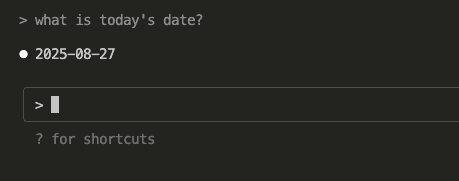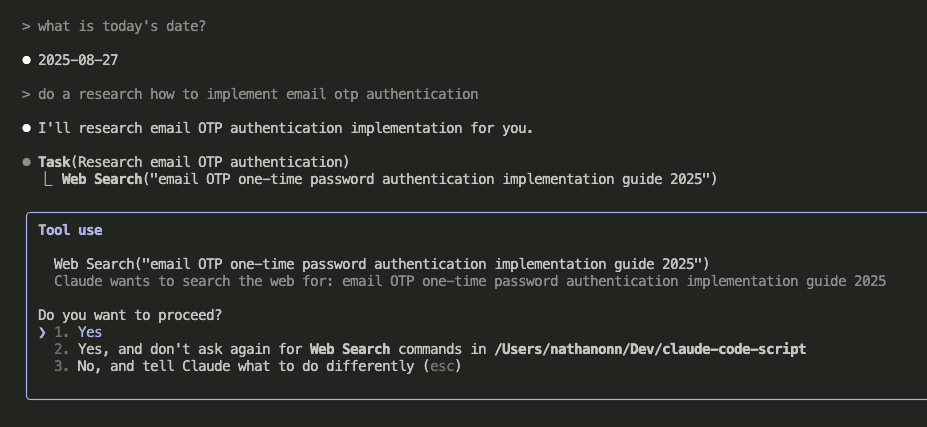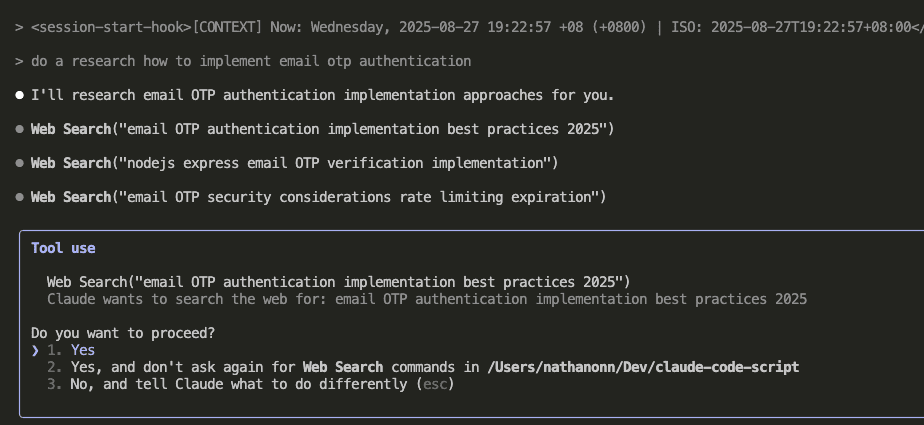The Claude Code Date Bug That’s Sabotaging Your Web Searches (And The 3-Minute Fix)
You fire up Claude Code to research the latest email authentication methods.
Claude starts searching… and brings back articles from 2024.

“But it’s 2025,” you think. “I need current information.”
You ask Claude directly: “What’s today’s date?”

“2025-08-27,” it responds correctly.
Then you ask it to search again. This time it searches for “email OTP authentication best practices 2025.”

Finally! Current information.
But next session?
You forget to ask for the date.
Back to 2024 searches.
This dance of “remember to ask for the date” is exhausting.
Let me show you the 3-minute fix that ensures Claude Code always knows what year it is – automatically.
.
.
.
The Problem: Claude Defaults to 2024 Without Context
Here’s what’s actually happening:
Claude Code knows the current date when you ask. But when it searches the web without that context, it defaults to 2024 – likely because that’s heavily represented in its training data.

Look at that screenshot.
Claude searches for “email OTP authentication implementation best practices security 2024” when you haven’t reminded it what year it is.
This means:
- You get outdated npm packages
- You miss breaking changes in frameworks
- You implement deprecated patterns
- You follow security practices that have been updated
The worst part? You don’t even realize it’s happening unless you carefully watch the search queries.
.
.
.
The Manual Workaround (That Actually Works)
The community discovered a workaround:
> what is today's date?
● 2025-08-27
> do a research how to implement email otp authentication
● I'll research email OTP authentication implementation for you...
● Web Search("email OTP authentication implementation best practices 2025")

By asking for the date first, Claude correctly searches with 2025.
It works! Every single time.
But here’s the problem…
Who remembers to ask “what is today’s date?” at the start of every coding session?
Nobody.
That’s who.
I’ll start a session, dive straight into coding, and 20 minutes later realize Claude’s been feeding me outdated information.
We need something automatic.
Something that just works without us having to remember.
.
.
.
Enter Claude Code Hooks: Your Automated Time Machine
Claude Code has a powerful but underused feature: hooks.
Hooks are scripts that run automatically at specific points in your Claude Code session. And here’s the beautiful part – anything they print to stdout gets injected directly into Claude’s context.
Every. Single. Session.
This means we can force Claude to always know the current date without ever having to ask.

.
.
.
The 3-Minute Implementation
Step 1: Create the Date Hook Script (1 minute)
Create a file at .claude/hooks/add-date.sh in your project:
#!/usr/bin/env bash
set -euo pipefail
# Force your timezone so "today/tomorrow" align correctly
TZ=${TZ:-Asia/Kuala_Lumpur} # Change to your timezone
# Human-friendly + machine-friendly timestamps
HUMAN=$(date +"%A, %Y-%m-%d %H:%M:%S %Z (%z)")
ISO=$(date -Iseconds)
# This gets injected into Claude's context
printf "[CONTEXT] Now: %s | ISO: %sn" "$HUMAN" "$ISO"
Make it executable:
chmod +x .claude/hooks/add-date.sh
Step 2: Register the Hook (1 minute)
Create or edit .claude/settings.json in your project:
{
"hooks": {
"SessionStart": [
{
"hooks": [
{
"type": "command",
"command": "$CLAUDE_PROJECT_DIR/.claude/hooks/add-date.sh"
}
]
}
]
}
}
Step 3: Restart Claude Code (1 minute)
Close and reopen Claude Code in your project directory.
That’s it. You’re done.
.
.
.
Join The Art of Vibe Coding—short, practical emails on shipping with AI (without the chaos).
No spam. Unsubscribe anytime. Seriously.
Want techniques like these weekly?
How It Works
Every time you start a Claude Code session, the hook automatically runs and injects something like this into Claude’s context:
[CONTEXT] Now: Wednesday, 2025-08-27 19:22:57 +08 (+0800) | ISO: 2025-08-27T19:22:57+08:00
Claude sees this before processing any of your requests. It’s impossible for it to forget what year it is.

Now when you ask Claude to research anything, it automatically searches with the correct year – without you having to ask for the date first:
> do a research how to implement email otp authentication
● I'll research email OTP authentication implementation approaches for you.
● Web Search("email OTP authentication implementation best practices 2025")
No more forgetting to ask for the date.
No more outdated searches.
No more deprecated solutions.
.
.
.
Before and After: The Difference Is Night and Day
Before (No Hook):
- Start Claude Code session
- Ask for help with authentication
- Claude searches for “authentication best practices 2024”
- You implement outdated patterns
- Discover issues during code review
- Realize you forgot to tell Claude the date
- Start over
After (With Hook):
- Start Claude Code session
- Hook automatically injects current date
- Ask for help with authentication
- Claude searches for “authentication best practices 2025”
- You get current, relevant information
- Ship with confidence
The manual workaround works – when you remember to use it. The hook ensures you never have to remember.
.
.
.
Advanced Tips & Customization
Tip 1: Project-Specific vs Global Hooks
You can place hooks in two locations:
Project-specific (what we did above):
.claude/settings.jsonin your project- Only affects this project
- Perfect for project-specific context
Global (affects all projects):
~/.claude/settings.jsonin your home directory- Applies to every Claude Code session
- Ideal for the date fix
For the date fix, I recommend global installation so all your projects benefit.
Tip 2: Timezone Alignment
If you’re working with a distributed team, standardize the timezone:
# Force UTC for consistency TZ=UTC # Or match your deployment region TZ=America/New_York # Or your local timezone TZ=Asia/Kuala_Lumpur
This ensures “today” and “tomorrow” mean the same thing to both you and Claude.
Tip 3: Add More Context
Why stop at dates? Inject other useful context:
#!/usr/bin/env bash
# Current date
printf "[CONTEXT] Now: %sn" "$(date +'%Y-%m-%d %H:%M:%S %Z')"
# Git branch
printf "[CONTEXT] Git Branch: %sn" "$(git branch --show-current 2>/dev/null || echo 'none')"
# Node version
printf "[CONTEXT] Node: %sn" "$(node --version 2>/dev/null || echo 'not installed')"
# Project type
if [ -f "package.json" ]; then
printf "[CONTEXT] Project: Node.js/JavaScriptn"
elif [ -f "Cargo.toml" ]; then
printf "[CONTEXT] Project: Rustn"
elif [ -f "go.mod" ]; then
printf "[CONTEXT] Project: Gon"
fi
Now Claude always knows your environment without asking.
Tip 4: Debug Output
Add this to see what’s being injected:
# At the end of your hook script printf "[CONTEXT] Hook executed at %sn" "$(date)" >&2
The >&2 sends it to stderr so you see it in the terminal but it doesn’t pollute Claude’s context.
.
.
.
Why This Matters More Than You Think
This isn’t just about getting the right year in searches.
When Claude knows the current date automatically:
- Package recommendations are current – No more “try this package” that was deprecated 6 months ago
- Security practices are up-to-date – Critical for authentication, encryption, and data handling
- Framework features are accurate – “Next.js 15 supports…” actually means Next.js 15, not 14
- API documentation is relevant – No more implementing v2 endpoints when v3 is current
- Time-relative queries work – “What changed last month” actually means last month
- No cognitive overhead – You never have to remember to “set the date” again
.
.
.
The Hidden Cost of Forgetting
Let’s be honest about how often we forget:
- Monday morning: Fresh start, dive straight into code. Forget to set date.
- After lunch: New session, immediate problem to solve. Forget to set date.
- Quick fix: “Just need to check something real quick.” Forget to set date.
- Context switch: Jump between projects. Forget to set date.
Each forgotten date request potentially means:
- Outdated package versions
- Deprecated API endpoints
- Old security practices
- Obsolete framework features
Multiply this by every session, every day, across your entire team.
The compound cost is enormous.
.
.
.
Your Action Items
- Implement the fix now (seriously, it takes 3 minutes)
- Choose your scope:
- Just this project? Use
.claude/settings.json - All projects? Use
~/.claude/settings.json - Team-wide? Add to your project template
- Just this project? Use
- Customize the timezone to match your work location
- Test it: Start a new session and ask Claude to research something current – without asking for the date first
- Share this with your team – everyone using Claude Code needs this fix
- Add to onboarding – Make this part of your developer setup checklist
.
.
.
The Bottom Line
The manual workaround works perfectly – when you remember to use it.
But depending on memory for something this critical is a recipe for outdated code.
This 3-minute hook implementation eliminates an entire category of errors caused by temporal confusion. Set it once, benefit forever.
Stop playing “remember to ask for the date” roulette.
Stop getting 2024 solutions in 2025.
Stop trusting your memory for something a computer should handle.
When will you implement this fix? How about right now?
P.S. – I discovered this problem after implementing three different deprecated API integrations in one week. Each time, I’d forgotten to ask Claude for the date at the start of my session. Three rewrites that could have been avoided with a 3-minute fix.
P.P.S. – The worst part? Claude’s 2024 solutions usually “work” – they’re just outdated. You don’t realize there’s a better, more secure, more efficient 2025 way until much later. Fix this now before it costs you more technical debt.
Leave a Comment